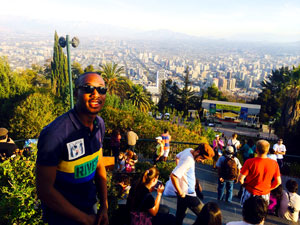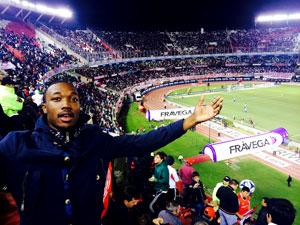
Do you think your program changed you as a person?
Delonte: Going abroad definitely changed me as a person. Every day I think about a new destination in the world I want to travel to. I am truly sick with wanderlust. However, more concretely, the program helped me see the world in a global mindset. I understand that what is done here in the United States often affects those in several other nations. I am also more careful and sensitive in the way that I speak to people. In Argentina, I learned the value of friendship and family. Interactions with those close to you are important because they will be by your side for the rest of your life.
Lastly, I became more calm as a person. Before traveling, I didn't realize how stressful and time-demanding American life is. During the program, it was crucial to understand and adapt to the Latin American time schedule, which is more relaxed.
Did you run into a language barrier? Did you ever think you knew more/less of the language?
Delonte: In elementary school, I was enrolled in a bi-lingual Spanish immersion program. From kindergarten, I acquired an ear for Spanish and thought I was pretty well equipped for my venture abroad to a Spanish speaking nation. Although I was ready, I believe I learned how to speak Spanish all over again.
The language base was present, but I had to take the challenge to learn the new accent and local words. For me, it was a challenge, but quite fun to use the new slang in everyday conversation. The best way to learn was to keep a running list of vocabulary in my phone. Whether it was on the bus, train, text, or in conversation, I would be sure to note and new words or phrases that I heard.
Having gone back to Buenos Aires, I can definitely say that I know more. I frequently receive comments on how well I speak "castellano" and I now consider myself fluent in Spanish.
Describe your most meaningful souvenir and why you love it?
Delonte: Oddly enough, while abroad, I could not find any souvenir to bring back from Buenos Aires. As I began to meet more locals, I found that my souvenirs began to be less tangible, but more of experiences and memories that filled my mind. The memories that I share with the friends that I made are priceless! There is not one day when I don't look back and wish I was back in Buenos Aires living that life again.
How has this experience impacted your future?

Delonte: When I first returned to the States, the reverse culture shock hit me pretty hard. I began to think of ways of how to constructively push those sentiments and thoughts into a tangible outcome. As result, I have been planning how to create a cultural exchange program between Argentine and African American students.
There is an image of black culture from America that is seen by the rest of the world that isn't exactly true. Likewise, many African Americans are an underrepresented study abroad demographic.
Moreover, in my professional life, I would like to create a study abroad program that focuses on advocating and giving the opportunity for more African American student to study abroad. Especially with the high profile cases of the past few years dealing with race relations, it is important for African Americans to know that they have a place in the world.